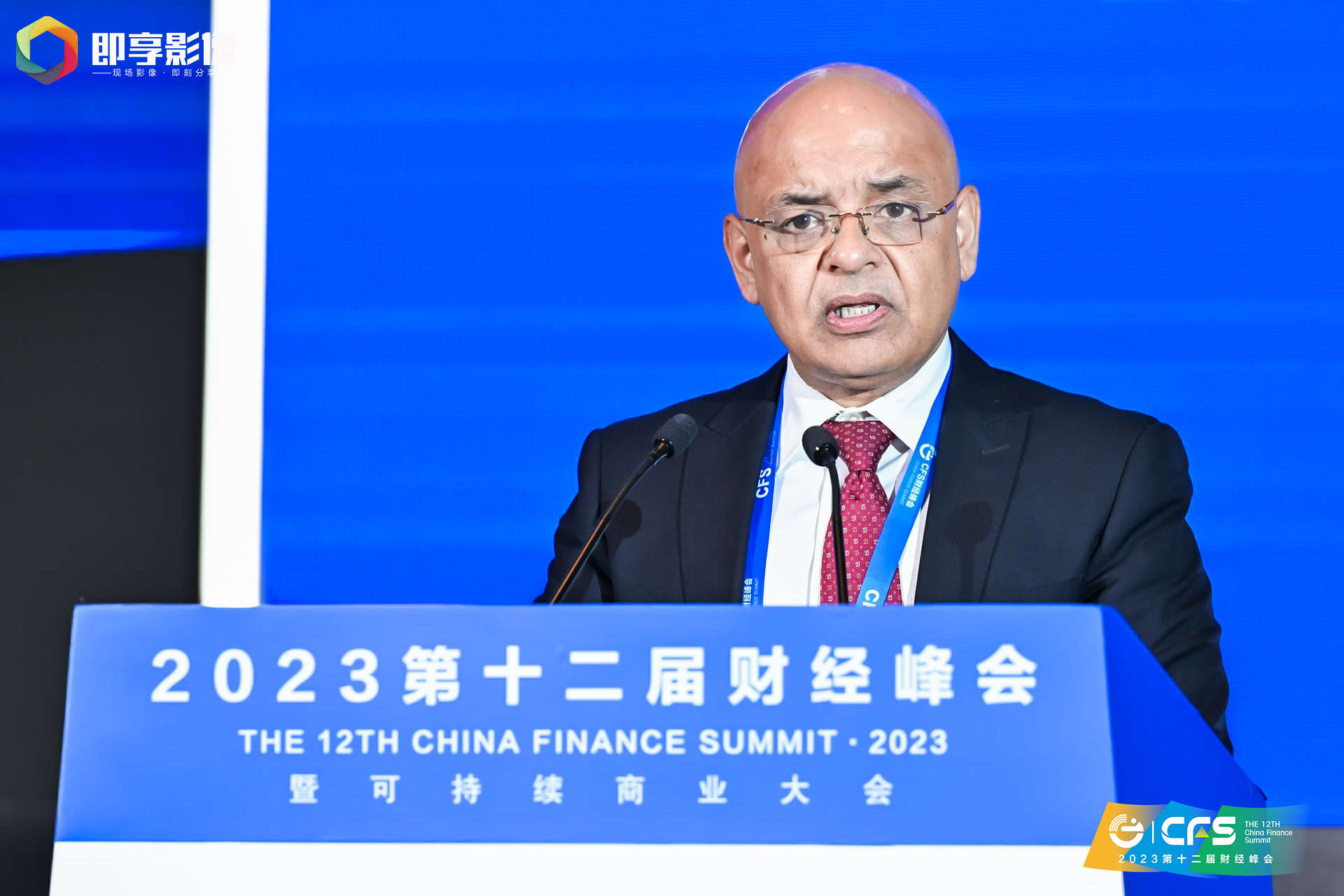7月26日-27日,备受瞩目的CFS第十二届财经峰会暨2023可持续商业大会在北京举行。本届峰会的主题为“激活高质量发展澎湃活力”,来自商界、政界、学界等领域与会嘉宾共同探讨当下发展所面临的挑战和机遇,提振发展信心,最大限度凝聚共识,深化合作,为助力经济高质量发展贡献力量。

以下是印度工商会联合会执行董事、厦门金砖国家经济文化研究服务中心发起人Atul Dalakoti在第十二届财经峰会暨可持续商业大会上的精彩致辞,由云现场整理。
Good day ladies and gentlemen. It is indeed a great pleasure for me to be part of the 12th Finance Summit which is being held in Beijing .
The current international landscape is a complicated one which is made more difficult by the Ukraine war and China US relationship. The whole idea of Globalization which was promoted by the developed world when it suited their economic interests, seems to be taking a back seat and we see the ugly head of de-globalization coming forward in the name of national interests and strategic requirements. We are seeing a lot of countries showing inflationary trends while others are facing the consequences of de-inflationary environment. International trade is under stress and we have major issues about Food Security. In all this the countries from the developing world are under tremendous pressure.
Friends, I am great supporter of the New Digital Economy which is truly the engine of global growth today. Any important financial discussion cannot ignore the fact that our future is tied to the New Economy and especially the companies that have already achieved Unicorn status or are going to reach that level soon. Unicorns all over the global are driven by the youth who are true disruptors and tend to look at traditional industries with a fresh perspective. Going forward we would require Digital Agriculture, Digital Retail, Digital Healthcare, Digital Logistics and most important a Digital Mindset for doing Businesses.
The world today is moving towards a “Shared Economy” concept which is more sustainable and green and is leading to lifestyle changes which are indeed driven by the young people who are using technology to completely transform our lives . With the big changes being brought by Artificial Intelligence , Big Data, Internet of Things and Augmented Reality , we are seeing a push towards the service sector to concentrate on the Shared Economy ideas. We hope there would be a better coordination and cooperation between countries in the shared economy area which should benefit all the countries, by creating a regulatory framework which can give a common platform for the Shared Economy companies to scale up their businesses and drive innovation to cover all parts of the world.
Autonomous vehicles would also play a big role in the things to come in the future which is totally changing the automobile companies and we are seeing many of the organizations manufacturing EV that are capable of being self-driven. We need to have policies in place where new technologies can be accepted at a faster pace by all the countries so that the benefit of new technology can be available at a fast pace to one and all. This can only be achieved if there is stable 5G connectivity and we are able to achieve data security where the customer’s life depends on these two important factors.
E-Commerce is seeing phenomenal growth all over the world. The number of people who are doing their shopping online , especially after the epidemic, has seen a huge growth and this trend is going to continue. For this there is a need to better understand the user base and the individual needs of the diversified consumers , for which there are a lot of opportunities for countries to work together as this is an important data bank. E-Commerce also is creating amazing logistic infrastructure which is labor intensive and creates job opportunities for a lot of young people.
There are also a lot of opportunities to help small and medium industries to grow. We should create a marketplace for agricultural products as the number of rural population in developing countries is still quite large. As the medium age of our populations increase , we should also create platforms for looking at Wellness and Alternate Medicine.
There is no doubt in my mind that the most important resource in the world today is human capital. You might come from the developed word or the developing world, opportunities today do not discriminate between people like before and like finance , human capital flows to the area which is most conducive to giving a great lifestyle to the people and give opportunities which are fair and equal and allows the human capital to fulfill their ambitions. Therefore in the past few years we have seen many important political leaders and business leaders who have talked about the importance of attracting the right human capital.
We need to work on the information infrastructure so that we can bridge the digital divide which exists with the developed world. Today the number of people who have access to internet connectivity has grown substantially. There are possibilities of hardware and software products being designed ,that would certainly help in creating a much better information infrastructure ,which in turn, would help the traditional businesses to do much better .
The last couple of years has seen a fast development in the content providers for the internet industry as the internet penetration of our markets has increased substantially. Short videos and news aggregators are seeing quite an amazing growth. The business of content is an important one as content is quite specific to a certain market.
Culture is an important part which helps in making bridges of friendship between countries. The young internet user is hungry for content and is open to international content. This is a huge market which would be driven by innovation and local cultural etiquettes which would define how an international player would be able to get into the local market. India which has the maximum amount of content being created including films and TV is looking to expand its market around the world .
These things can only be possible if we have a talent pool from all countries which is able to freely move within these countries and be able to help meet the immense human resource requirements of the fast growing new economy. Ladies and gentlemen we need to quickly work on this so that we can create a dynamic eco system for the new economy companies to grow at a rapid pace, being multilocational and having a workforce which is truly diverse to give an impetus to the New Economy companies who would then create Unicorns that we all can be proud of. India is the third largest ecosystem for start-ups after US and China. Industries like Auto, Fintech, Cleantech, Agritech , Artificial Intelligence and Climate Tech are projected to secure high valuations in 2023
In 2021 we had 46 companies in India who were able to achieve Unicorn status. In 2022 the number is down to 22 as there is pressure on funding. Even though the Unicorns may have fallen in number , we see the number of Gazelles and Cheetahs who are the future Unicorns going up this year which shows that 2023-24 should be a year to watch.
As the number of funding rounds dropped by 30% from Jan-Nov 2021 to the same period in 2022, the bigger deals declined even sharper. The number of companies closing $100 million plus funding rounds has also dropped by 35% to 55 in 2022, as compared to 85 in the same period last year.
One of the most famous India start-ups is no doubt OYO with whom I am also associated for the past 6 years. In 2012, Ritesh Agarwal launched the company to enable listing and booking of budget accommodations. OYO partnered with hotels to give similar guest experience across cities. In 2019, OYO had over 17,000 employees globally, of which approximately 8000 are in India and South Asia. OYO Hotels & Homes is a full-fledged hotel chain that leases and franchises assets. The company invests in capital expenditure, hires general managers to oversee operations and customer experience, and generates around a million job opportunities in India and South Asia alone. OYO set up 26 training institutes for hospitality enthusiasts across India in 2019. They have no doubt redefined the hotel industry and have created value for their partners and for the customers.
I would like to talk about India and China who have a combined population of more than 2.8 billion. China and India are ancient civilizations who have cohabitated in Asia for a long time and have had good neighborly relationship and both of them have made major contributions to the growth of the human civilization.
With the amazing policy of opening up and economic reforms China has in the past 40 years made tremendous progress and today has become the second largest economy. India with a great demographic advantage having such a young population and is the back office of the world , is also going to grow at a good speed and become the third largest economy of the world soon.
India today has more than 700 million internet subscribers and has become one of the largest and fastest-growing markets for digital consumers. As digital capabilities improve and connectivity becomes omnipresent, technology is poised to quickly and radically change nearly every sector of India’s economy. That is likely to both create significant economic value and change the nature of work for tens of millions of Indians and totally transform the manufacturing industry in India.
India is in the process of becoming a digitally advanced country as it ushers in a situation where falling cost and rising availability of smartphones and high speed connectivity has given India a fast paced growing base of digital consumers and the pace of digitalization is even become faster than a lot of developed economies.
China has a world class infrastructure which is an envy of the world. We can work together in areas of AI, Big Data, 5G , High speed trains, Metros, Expressways, Bridges , Ports and Airports and create huge connectivities between our nations. India needs to develop its infrastructure as soon as possible to really increase the speed of its transformation.
My wish is that India and China should become the champions of the new economy and globalization and work together to create a new world order which is based on the principles of equity and transparency. In this the young people have to play a very important role. Today a lot of young people who have studied in international institutions have had class-mates from all over the world and this connectivity is of great importance. The new economy would rely on these connectivities to create businesses which are truly cross border which then can grow and become multi-locational companies and become the multinational companies of the future.
We have launched a BRICS Centre for Economic and Cultural Research & Services and Xiamen BRICS Science and Technology Services Company in Xiamen. These two entities would work on cross border relations between private sector to link the resources , talents , technology , and cross border services. We aims to attract the participation of small and medium sized enterprises and integrate talents, services and other resources. All of you are welcome to get in touch with us.
We are really committed to the New Economy initiatives and would be happy to work with like-minded organizations and individuals to create platforms of connectivity. We welcome all of you to connect with us and we can work together to create more opportunities in the new economy area and truly become partners for a shared prosperous future.
I want to wish all the participants of this program best of luck and good health !
Thank you!!!





